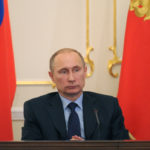BBG Watch Commentary

President Vladimir Putin has ordered the merger of the RIA Novosti news agency and the Voice of Russia (VOR) broadcasting company to set up Rossia Segodnya (Russia Today) international news agency. A BBC correspondent in Moscow reports that the move is viewed by the opposition as an attempt to increase the Kremlin’s control and to strengthen its propaganda abroad.
The Russian move also represents a new challenge for U.S. international media outreach efforts managed by the Broadcasting Board of Governors (BBG).
As of today, the Voice of Russia radio company has officially ceased to exist in its previous capacity and will merge with several other state-run news agencies to emerge as Rossia Segodnya (Russia Today), a Russia-based international news service, Voice of Russia reported on its English-language website.
Dmitry Kiselyov was appointed General Director of the new “Rossia Segodnya” news agency.
The new entity reportedly will not be related to very successful media outlet RT, which was formerly called Russia Today. RT is also controlled by the Kremlin.
The reorganization of Voice of Russia, RIA Novosti and some other state-run media outlets is aimed at cost-effectiveness and efficiency, Presidential Administration Head Sergei Ivanov told reporters on Monday.
The Russian government already funds and manages a highly popular “Russia Today” international TV and multimedia news channel.
Read more: “President Vladimir Putin issues decree to reorganize Voice of Russia, RIA Novosti to Rossia Segodnya news wire,” Voice of Russia, December 9, 2013.
Daniel Sandford, BBC News correspondent in Moscow posted this comment:
“Of all the state-owned media organisations, RIA Novosti has made the greatest attempt to produce balanced coverage in recent years. This was in part because of its international clients in media organisations around the world. It would have lost credibility otherwise.
But now the agency is being taken over by the Russia Today brand, which for opposition-minded Russians is more of a government mouthpiece, giving carefully selected news with a clear pro-Kremlin bias.
The word “propaganda” – never far from the Kremlin’s opponents’ lips when they are discussing state-controlled Russian television news – is now also being used to describe the new news agency.”
Read more: “Russian news agency RIA Novosti closed down,” BBC, December 9, 2013.
BBC news report on Putin’s media reorganization moves shows 899 Facebook “Likes” as of Monday noon ET.
The Voice of America (VOA) English news website has not yet reported on Putin’s latest media move. VOA English News is often late in reporting on U.S. and international news developments, provides superficial coverage, and sometimes fails to report on important news stories.
U.S. international media outreach may also be in need of major reforms.
Critics say that VOA English News has been practically defunct in recent years. Instead of providing original news coverage from Ukraine over the weekend, the Voice of America English website relied on news reports from Reuters, a UK-based news agency. Last week the VOA English website failed to cover Lech Wałęsa’s visit to the U.S. Congress and his comments on the lack of America’s and President Obama’s moral and political leadership on the international scene. The Voice of America English website also failed to cover Vice President Joe Biden’s speech in Beijing, China, on human rights and media freedom.
One former VOA broadcaster observed that if the Voice of America covered the news in the 1980s the same way as it does now, Solidarity leader Lech Wałęsa might still be sitting in a communist jail.
The Broadcasting Board of Governors has overall responsibility for the Voice of America and other U.S. government-funded broadcasters such as Radio Free Europe / Radio Liberty (RFE/RL) and Radio Free Asia (RFA), which are performing much better than VOA under separate non-profit entity management.
But the overall management of U.S. international broadcasting by executives of the BBG’s International Broadcasting Bureau (IBB) has been disastrous in recent years, according to critics. These critics include former Secretary of State Hillary Clinton, herself a former BBG member, who in her last congressional testimony in 2013 described U.S. international media outreach as “defunct.”
In her earlier congressional testimony, in March 2011, Secretary Clinton expressed envy at the success of Russia Today and said that that the U.S. is losing the information war.
Since last summer, the bipartisan BBG board has new chairman, Jeff Shell, and three other new members. They are believed to be working on reforming U.S. international broadcasting, but no major changes have been announced so far.
A proposal to establish a CEO for U.S. international broadcasting is pending congressional approval. The only new development in the management of U.S. international broadcasting has been the retirement of IBB director Richard Lobo. He had left the agency on November 30.
Lobo was highly praised by Jeff Shell and the new BBG Board, but sources told BBG Watch that Shell and other BBG members were reportedly happy to see him go as they prepare their reform agenda. According to the same sources, while Lobo may not have done anything to improve the situation during his tenure, U.S. international broadcasting has been made dysfunctional not by him but by much longer serving IBB and VOA executives who are still firmly in charge.
